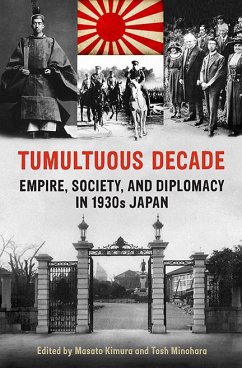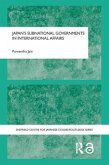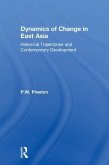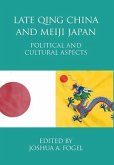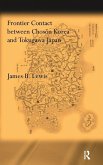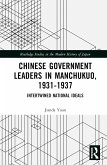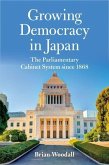- Gebundenes Buch
- Merkliste
- Auf die Merkliste
- Bewerten Bewerten
- Teilen
- Produkt teilen
- Produkterinnerung
- Produkterinnerung
Featuring an interdisciplinary and international group of scholars, Tumultuous Decade examines Japanese domestic and foreign affairs between 1931 and 1941.
Andere Kunden interessierten sich auch für
![The Anglo-Japanese Alliance, 1902-1922 The Anglo-Japanese Alliance, 1902-1922]() Phillips O'BrienThe Anglo-Japanese Alliance, 1902-1922187,99 €
Phillips O'BrienThe Anglo-Japanese Alliance, 1902-1922187,99 €![Japan's Subnational Governments in International Affairs Japan's Subnational Governments in International Affairs]() Purnendra JainJapan's Subnational Governments in International Affairs179,99 €
Purnendra JainJapan's Subnational Governments in International Affairs179,99 €![Dynamics of Change in East Asia Dynamics of Change in East Asia]() P W PrestonDynamics of Change in East Asia188,99 €
P W PrestonDynamics of Change in East Asia188,99 €![Late Qing China and Meiji Japan Late Qing China and Meiji Japan]() Late Qing China and Meiji Japan50,99 €
Late Qing China and Meiji Japan50,99 €![Frontier Contact Between Choson Korea and Tokugawa Japan Frontier Contact Between Choson Korea and Tokugawa Japan]() James B LewisFrontier Contact Between Choson Korea and Tokugawa Japan187,99 €
James B LewisFrontier Contact Between Choson Korea and Tokugawa Japan187,99 €![Chinese Government Leaders in Manchukuo, 1931-1937 Chinese Government Leaders in Manchukuo, 1931-1937]() Jianda YuanChinese Government Leaders in Manchukuo, 1931-1937168,99 €
Jianda YuanChinese Government Leaders in Manchukuo, 1931-1937168,99 €![Growing Democracy in Japan Growing Democracy in Japan]() Brian WoodallGrowing Democracy in Japan32,99 €
Brian WoodallGrowing Democracy in Japan32,99 €-
-
-
Featuring an interdisciplinary and international group of scholars, Tumultuous Decade examines Japanese domestic and foreign affairs between 1931 and 1941.
Hinweis: Dieser Artikel kann nur an eine deutsche Lieferadresse ausgeliefert werden.
Hinweis: Dieser Artikel kann nur an eine deutsche Lieferadresse ausgeliefert werden.
Produktdetails
- Produktdetails
- Verlag: University of Toronto Press
- Seitenzahl: 328
- Erscheinungstermin: 9. April 2013
- Englisch
- Abmessung: 231mm x 155mm x 25mm
- Gewicht: 612g
- ISBN-13: 9781442643864
- ISBN-10: 1442643862
- Artikelnr.: 35564275
- Herstellerkennzeichnung
- Libri GmbH
- Europaallee 1
- 36244 Bad Hersfeld
- gpsr@libri.de
- Verlag: University of Toronto Press
- Seitenzahl: 328
- Erscheinungstermin: 9. April 2013
- Englisch
- Abmessung: 231mm x 155mm x 25mm
- Gewicht: 612g
- ISBN-13: 9781442643864
- ISBN-10: 1442643862
- Artikelnr.: 35564275
- Herstellerkennzeichnung
- Libri GmbH
- Europaallee 1
- 36244 Bad Hersfeld
- gpsr@libri.de
Masato Kimura is director of the Shibusawa Eiichi Memorial Foundation.
Part I: Economics, Culture, Society and Identity Chapter 1: Zaikai’s Perception of and Orientation to the United States - Masato Kimura (Shibusawa Eiichi Memorial Foundation) Chapter 2: Cultural Internationalism and Japan’s Wartime Empire: The Turns of the Kokusai Bunka Shink
kai - Jessamyn R. Abel (Pennsylvania State University) Chapter 3: Japanese Pan-Asianism through the Mirror of Pan-Islamism - Cemil Aydin (University of North Carolina, Chapel Hill) Chapter 4: Emperor, Family and Modernity: The 1940 Passage of the National Eugenics Law - Sumiko Otsubo (Metropolitan State University) Part II: The Empire and Imperial Concerns Chapter 5: Strengthening and Expanding Japan through Social Work in Colonial Taiwan - Evan Dawley (U.S. Department of State) Chapter 6: Between Collaboration and Conflict: State and Society in Wartime Korea - Jun Uchida (Stanford University) Chapter 7: The Thought War: Public Diplomacy by Japan's Immigrants in the U.S. - Yuka Fujioka (Kwansei Gakuin University) Part III: High Diplomacy and the Statesmen Chapter 8: Meiji Diplomacy in the Early 1930s: Uchida K
sai, Manchuria and Post-withdrawal Foreign Policy - Rustin Gates (Bradley University) Chapter 9: Japan’s Diplomatic Gamble for Autonomy: Rethinking Matsuoka Y
suke’s Diplomacy - Satoshi Hattori (Osaka University) Chapter 10: Dissembling Diplomatist: Admiral Toyoda Teijir
and the Politics of Japanese Security - Peter Mauch (University of Western Sydney) Chapter 11: “No Choice but to Rise”: Togo Shigenori and Japan’s Decision for War - Tosh Minohara (K
be University)
kai - Jessamyn R. Abel (Pennsylvania State University) Chapter 3: Japanese Pan-Asianism through the Mirror of Pan-Islamism - Cemil Aydin (University of North Carolina, Chapel Hill) Chapter 4: Emperor, Family and Modernity: The 1940 Passage of the National Eugenics Law - Sumiko Otsubo (Metropolitan State University) Part II: The Empire and Imperial Concerns Chapter 5: Strengthening and Expanding Japan through Social Work in Colonial Taiwan - Evan Dawley (U.S. Department of State) Chapter 6: Between Collaboration and Conflict: State and Society in Wartime Korea - Jun Uchida (Stanford University) Chapter 7: The Thought War: Public Diplomacy by Japan's Immigrants in the U.S. - Yuka Fujioka (Kwansei Gakuin University) Part III: High Diplomacy and the Statesmen Chapter 8: Meiji Diplomacy in the Early 1930s: Uchida K
sai, Manchuria and Post-withdrawal Foreign Policy - Rustin Gates (Bradley University) Chapter 9: Japan’s Diplomatic Gamble for Autonomy: Rethinking Matsuoka Y
suke’s Diplomacy - Satoshi Hattori (Osaka University) Chapter 10: Dissembling Diplomatist: Admiral Toyoda Teijir
and the Politics of Japanese Security - Peter Mauch (University of Western Sydney) Chapter 11: “No Choice but to Rise”: Togo Shigenori and Japan’s Decision for War - Tosh Minohara (K
be University)
Part I: Economics, Culture, Society and Identity Chapter 1: Zaikai’s Perception of and Orientation to the United States - Masato Kimura (Shibusawa Eiichi Memorial Foundation) Chapter 2: Cultural Internationalism and Japan’s Wartime Empire: The Turns of the Kokusai Bunka Shink
kai - Jessamyn R. Abel (Pennsylvania State University) Chapter 3: Japanese Pan-Asianism through the Mirror of Pan-Islamism - Cemil Aydin (University of North Carolina, Chapel Hill) Chapter 4: Emperor, Family and Modernity: The 1940 Passage of the National Eugenics Law - Sumiko Otsubo (Metropolitan State University) Part II: The Empire and Imperial Concerns Chapter 5: Strengthening and Expanding Japan through Social Work in Colonial Taiwan - Evan Dawley (U.S. Department of State) Chapter 6: Between Collaboration and Conflict: State and Society in Wartime Korea - Jun Uchida (Stanford University) Chapter 7: The Thought War: Public Diplomacy by Japan's Immigrants in the U.S. - Yuka Fujioka (Kwansei Gakuin University) Part III: High Diplomacy and the Statesmen Chapter 8: Meiji Diplomacy in the Early 1930s: Uchida K
sai, Manchuria and Post-withdrawal Foreign Policy - Rustin Gates (Bradley University) Chapter 9: Japan’s Diplomatic Gamble for Autonomy: Rethinking Matsuoka Y
suke’s Diplomacy - Satoshi Hattori (Osaka University) Chapter 10: Dissembling Diplomatist: Admiral Toyoda Teijir
and the Politics of Japanese Security - Peter Mauch (University of Western Sydney) Chapter 11: “No Choice but to Rise”: Togo Shigenori and Japan’s Decision for War - Tosh Minohara (K
be University)
kai - Jessamyn R. Abel (Pennsylvania State University) Chapter 3: Japanese Pan-Asianism through the Mirror of Pan-Islamism - Cemil Aydin (University of North Carolina, Chapel Hill) Chapter 4: Emperor, Family and Modernity: The 1940 Passage of the National Eugenics Law - Sumiko Otsubo (Metropolitan State University) Part II: The Empire and Imperial Concerns Chapter 5: Strengthening and Expanding Japan through Social Work in Colonial Taiwan - Evan Dawley (U.S. Department of State) Chapter 6: Between Collaboration and Conflict: State and Society in Wartime Korea - Jun Uchida (Stanford University) Chapter 7: The Thought War: Public Diplomacy by Japan's Immigrants in the U.S. - Yuka Fujioka (Kwansei Gakuin University) Part III: High Diplomacy and the Statesmen Chapter 8: Meiji Diplomacy in the Early 1930s: Uchida K
sai, Manchuria and Post-withdrawal Foreign Policy - Rustin Gates (Bradley University) Chapter 9: Japan’s Diplomatic Gamble for Autonomy: Rethinking Matsuoka Y
suke’s Diplomacy - Satoshi Hattori (Osaka University) Chapter 10: Dissembling Diplomatist: Admiral Toyoda Teijir
and the Politics of Japanese Security - Peter Mauch (University of Western Sydney) Chapter 11: “No Choice but to Rise”: Togo Shigenori and Japan’s Decision for War - Tosh Minohara (K
be University)

